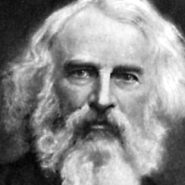The time you won your town the race
We chaired you through the market-place;
Man and boy stood cheering by,
And home we brought you shoulder-high.
Today, the road all runners come,
Shoulder-high we bring you home,
And set you at your threshold down,
Townsman of a stiller town.
Smart lad, to slip betimes away
From fields where glory does not stay,
And early though the laurel grows
It withers quicker than the rose.
Eyes the shady night has shut
Cannot see the record cut,
And silence sounds no worse than cheers
After earth has stopped the ears:
Now you will not swell the rout
Of lads that wore their honours out,
Runners whom renown outran
And the name died before the man.
So set, before its echoes fade,
The fleet foot on the sill of shade,
And hold to the low lintel up
The still-defended challenge-cup.
And round that early-laurelled head
Will flock to gaze the strengthless dead,
And find unwithered on its curls
The garland briefer than a girl’s.
Originally published in A Shropshire Lad (1896) by A. E. Housman. Public domain.
Analysis
A. E. Housman’s “To an Athlete Dying Young” transforms tragedy into elegy, finding quiet dignity in a premature death. The poem opens with the familiar image of athletic victory—“We chaired you through the market-place”—then mirrors it in a funeral procession. Glory, once public and triumphant, becomes funereal and still. This structural symmetry underscores the central paradox: the athlete’s early death preserves his fame from the decay of time.
Housman’s tone is tender but stoic, offering neither comfort nor sentimentality. Instead, he presents death as a kind of preservation. The “smart lad” who “slips betimes away” avoids the disillusionment of faded renown. Beneath its calm rhythm and regular rhyme, however, lies a subtle unease: the consolation depends on the value of reputation, not life itself. The poem’s musical simplicity conceals its emotional complexity — a blend of irony, melancholy, and admiration.
The poem also reflects the late-Victorian fascination with mortality and honor. Housman, deeply influenced by classical elegy, writes in a restrained style reminiscent of Latin lyric poets like Horace. The laurel, symbol of victory, becomes the poem’s moral emblem — glorious but transient, as susceptible to decay as human memory. In its perfect balance of emotion and restraint, “To an Athlete Dying Young” remains one of the most haunting meditations on fame, youth, and impermanence.
